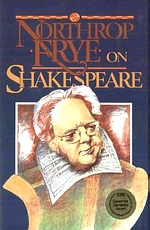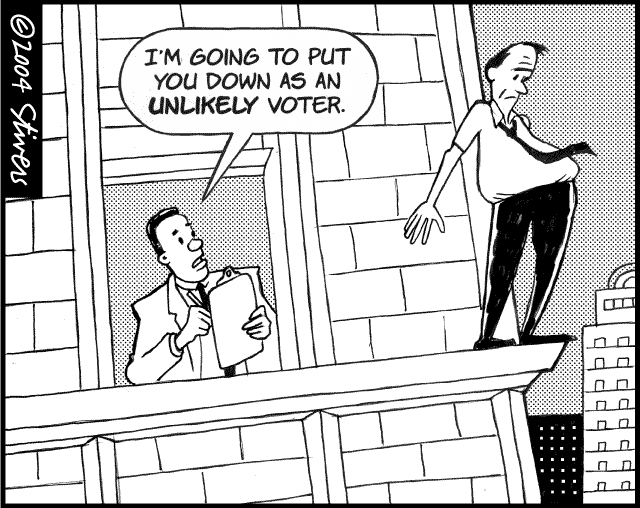Our Easter post from last year is here. It includes a link to a vintage CBC Radio recording of Frye talking about Easter.
Monthly Archives: April 2011
Frye Shakespeare Anecdote
This absolutely ludicrous cover for the first edition of On Shakespeare is one of my most treasured possessions. It is of course based upon the Droeshout portrait. The publisher apparently did not know that Frye mischievously said of this portrait that it depicts “a man who is clearly an idiot.”
Here’s a Frye anecdote it’s never occurred to me to relate here before. I took his undergrad Shakespeare course, which he taught that year with Julian Patrick. The arrangement was that they would each give a one hour lecture per week, the third hour reserved for tutorials. Each also attended the other’s lectures. As the end of the second term approached, Patrick made reference to the fact that our final exam was to be April 23rd. “Shakespeare’s birthday,” he said encouragingly. Frye piped up: “Also the day he died,” which brought a roar of laughter from the class of about two hundred students. I’m glad to say we gave him a sustained round of applause at the end of his last lecture, which, as he left the stage, he paused to acknowledge with a small but pleased smile.
Saturday Night Documentary: “Looking for Richard”
httpv://www.youtube.com/watch?v=4dywuhEwzjo
To celebrate Shakespeare’s 447th birthday, here’s Al Pacino’s excellent film about putting together a production of Richard III, Looking for Richard. Treat yourself: watch this. It’s very lively, and the performances are wonderful. As a bonus, there are French subtitles.
Shakespeare
httpv://www.youtube.com/watch?v=OY4HdGJcJVo
The Reduced Shakespeare Company’s very funny and completely irrelevant biography of Shakespeare
Today is the anniversary of both Shakespeare‘s birth (traditionally ascribed to this date) and his death: 1564-1616. If we decide to observe this anniversary here every year, we’ve got lots to work with because the new Collected Works volume of Frye on Shakespeare is now out.
Frye produced more essays and books on Shakespeare than on any other writer, Blake included. The reasons don’t need to be guessed at. Shakespeare’s is a comprehensive literary imagination, and the four traditional dramatic genres — comedy, tragedy, history, and romance — are (if we take the history plays to be a form of irony-satire) expressions of the four mythoi laid out in Anatomy. The two were made for each other.
Now that we seem to be outgrowing the cramped restrictions of the literary criticism of the last thirty years, it’s easier to talk openly again about an imagination so vast that it is difficult to conceive of any boundary to it. Shakespeare’s global appeal is perhaps the best evidence there is of imaginative constants common to all people and all cultures — a universality recognizable as shared human desires and expectations whose imaginative dimension is always available to be explored. Shakespeare’s articulation of them as archetypal concerns is, of course, also a matter of poetry so fully realized that it cannot be entirely lost in translation. His wide appeal seems to be that he not only brings out the best in the English language, but also the best in any language that makes his work part of its own.
We can begin just about anywhere when it comes to Frye on Shakespeare. It’s always easy, for example, to be drawn to the way he consistently pushes aside our reflexive instincts to engage in biographical fallacy, especially when confronted with genius this expansive. It’s not that Shakespeare doesn’t have a biography that might in some way on some occasions be relevant to the work. It’s that Shakespeare’s literary power far exceeds any biographical consideration. The reductive nature of much Shakespearean critical biography ends up as an embarrassment. As Frye says, when a literary critic takes on Shakespeare, it is the critic and not Shakespeare who is being judged. His unique contribution to Shakespeare scholarship is crediting the independent authority that the literary work itself always possesses, even if that authority is only imperfectly understood. The single biographical detail that gives me a thrill is the coincidence of a life beginning and ending on the same date. It means nothing as a matter of historical fact, but it does suggest that when those arbitrary dates are superstitiously aligned, our notions of life and death may cancel one another out, leaving behind an imaginative perspective that encompasses both. And that is something that is always relevant to Shakespeare.
So let’s start this year with this observation from “Shakespeare and the Modern World”:
Human nature being what it is, a great deal of writing on Shakespeare has consisted of efforts to peek around the personal barrier. I am not speaking of the cranks who have tried to prove that he was somebody else, although the number and vociferousness of them show how irritated people get when they can’t attach a body of poetry to a personal body. I am speaking of serious people who have ransacked the plays for clues to Shakespeare’s moods when he wrote them, and then tried to string the moods together into a biography. In the sonnets, Wordsworth said in a moment of misguided enthusiasm, Shakespeare unlocked his heart; so hundreds of people have read the sonnets for no other purpose than to try to find out who W.H. and the youth and the dark lady and the rival poet were. One scholar, Caroline Spurgeon, studied the imagery of the plays in search of unconsciously dropped clues to the writer’s personality. What emerged was a dismally amiable mediocrity whose favorite game was probably bowls. It is a pitiful haul that scholars have salvaged from their research: a will, a few addresses, a baptismal certificate, and some financial transactions that suggest only a commonplace middle-class snob. (CW 28, 231)
TGIGF: “The Bright Side of Life”
httpv://www.youtube.com/watch?v=1loyjm4SOa0
“The Bright Side of Life” from Monty Python’s Life of Brian
It’s Good Friday and it seemed a good idea a couple of days ago to post some Christian standup. Christianity may be a divine comedy, but on the evidence provided by YouTube, there isn’t much that’s funny about Christian comedy. It’s like what Howard Stern says about country music: think of the worst song on an Eagles album — that’s country music. The rubber chicken and corn shtick that comedians gave up on fifty years ago (including an ominously unself-aware subtext: e.g. dad taking off his belt to give someone a good whipping) is like a mobile meth lab to Christian comedians. The laughter it generates certainly sounds chemically induced.
This bit from Monty Python may not be the funniest piece of religious satire ever conceived, but it is one of the most cheerful, and that seems appropriate enough. It is Easter Eve Eve after all.
Vladimir Nabokov
httpv://www.youtube.com/watch?v=Ldpj_5JNFoA
Nabokov in conversation with Pierre Berton and Lionel Trilling about Lolita. (Part 2 of the interview after the jump.)
Today is Vladimir Nabokov‘s birthday (1899-1977).
From The Modern Century:
In Vladimir Nabokov’s novel, Pale Fire, a gentle, wistful, rather touching pastoral poem falls into the hands of a lunatic who proceeds to “annotate” it with a wild paranoid fantasy about his own adventures as a prince in some European state during a revolution. Poem and commentary have nothing to do with each other, and perhaps that is the only point the book makes. But the title, taken from Shakespeare’s Timon of Athens [4.3.438], suggests a certain allegory of the relation of art to the wish-fulfillment fantasies that keep bucking and plunging underneath it. Such forces are in all of us, and are strong enough to destroy the world if they are not controlled through release instead of repression. In my last lecture I want to talk about the way in which the creative arts are absorbed into society through education. Meanwhile we may notice that the real basis for the opposition of artist and society is the fact that not merely communications media and public relations, but the whole structure of society itself, is an anti-art, and old and worn-out creation that needs to be created anew. (CW 10, 48)
Polls, Polls, Polls
Want to know why the polls are all over the place? Read this.
What seems clear, however, is that things are more or less the way they were before the writ was dropped. Harper has peaked. His game of divide and rule has reached its limit. He can’t pick up any support because a significant portion of the population outside of the west simply does not trust him. At the same time, the months of branding Michael Ignatieff in a relentless smear campaign has had its effect. And Jack Layton, meanwhile, has been enjoying a “surge” the last couple of days, thanks to notoriously unreliable online polls in which the young urban population is over-represented. The old saying is that the only poll that matters is the one on election day. Thanks to poor polling practices, that’s especially true this time round.
In any event, it looks like another Conservative minority at this point.
Video of the Day: “There are no nations. There are no peoples. There are only dollars”
httpv://www.youtube.com/watch?v=5B1uF9gmkVw
Everyone remembers Howard Beale’s “I’m mad as hell” speech from Network. But, while less viscerally memorable, this speech by Beale’s corporate nemesis, Arthur Jensen, is the movie’s darkly revealed core.
Network got it exactly right about the decline of television news into infotainment based upon already discernible trends in the early 1970s, right down to the frenzied pursuit of profit, whatever the social cost, as represented now by Fox News. But the movie also got it right about transnational corporatism, whose fundamental principles are lucidly laid out in the clip above.
Government representing the actual interests of actual citizens is a threatened species, which is suggested by the hoarding-insect behavior of an increasing number of politicians. Our votes are gradually devolving into the means by which the more cynical elements of the political class gain access to power (typically through progressively unhinged demagoguery), and whose single-minded purpose is to promote commercial interests at the expense of everything else, including the institution of government itself. Conservatives especially know that, just as it is easier to lie than to tell the truth, it is much easier to cut taxes to the richest of the rich than it is to reclaim that lost revenue from them somewhere down the line. Just look at the Bush tax cuts in the States. Those “temporary” cuts are, at the moment, the single greatest threat to an economy that could shed its deficit burden almost completely just by letting them lapse as they were supposed to do in the first place. As it is, the current Republican “debate” on budget cuts revolves around dismantling Medicare while, of course, providing still more top end tax cuts.
It promises to get worse before we can think about it getting even marginally better. Most of the population is still living in a world where political authorities are trusted to a minimally acceptable degree. It seems they will only be disabused of that misplaced trust one bloody insult and injury at a time. People understandably want to feel that their elected representatives have some residual sense of duty to them. On the right side of the political spectrum most notably, it’s getting harder to find any sign at all to suggest that might still be true.
The world we live in is looking more and more like the dysfunctional state described in the monologue above: no national or personal interests, just corporate ones in a multi-national sacrifice-ritual of saps who think they have elected governments to (snicker) “represent” them. Our elected officials are more openly go-getters in the exciting new world of transnational economies, where national wealth is just one more resource to cheat out of the suckers who haven’t figured that out yet.
So watch the clip above. Listen to what is said, and see if you don’t recognize it as a frighteningly rendered version of a world that is already way more familiar to us than it should be. (As sometimes happens, this video cannot be embedded: click on the image and hit the YouTube link.)
Chart of the Day: Diminishing Tax Burden of the 400 Richest
Remember:
The richest 400 Americans possess more wealth than the “bottom” 155,000,000 (!!) Americans. And yet their effective tax rates have been diminishing for the last 16 years. The pattern is consistent among Canada’s richest.
Andrew Sullivan’s post here.
Harold Lloyd
httpv://www.youtube.com/watch?v=QEcTjhUN_7U
One of the greatest bits ever committed to film during the silent era
Today is Harold Lloyd‘s birthday (1893-1971). Frye was a fan as a child. Above is the signature Lloyd routine from Safety Last!
An earlier post on Frye’s love of silent movies here. Bob Denham’s compilation, “Frye and the Movies,” here.
The movie that haunted the young Frye here.



